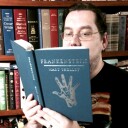
bettyehollands
Weird but good.

Bookhype may earn a small commission from qualifying purchases. Full disclosure.
Considered lurid and shocking by mid-19th-century standards, Wuthering Heights was initially thought to be such a publishing risk that its author, Emily Brontë, was asked to pay some of the publication costs. A somber tale of consuming passions and vengeance played out against the lonely moors of northern England, the book proved to be one of the most enduring classics of English literature.
The turbulent and tempestuous love story of Cathy and Heathcliff spans two generations — from the time Heathcliff, a strange, coarse young boy, is brought to live on the Earnshaws' windswept estate, through Cathy's marriage to Edgar Linton and Heathcliff's plans for revenge, to Cathy's death years later and the eventual union of the surviving Earnshaw and Linton heirs.
A masterpiece of imaginative fiction, Wuthering Heights (the author's only novel) remains as poignant and compelling today as it was when first published in 1847.
(back cover)

Weird but good.

This review is written with a GPL 4.0 license and the rights contained therein shall supersede all TOS by any and all websites in regards to copying and sharing without proper authorization and permissions. Crossposted at WordPress, Blogspot & Librarything by Bookstooge’s Exalted Permission
Title: Wuthering Heights
Series: ----------
Author: Emily Bronte
Rating: 5 of 5 Stars
Genre: Classic
Pages: 339
Words: 119.5K
Synopsis:
From Wikipedia
In 1801, Lockwood, the new tenant at Thrushcross Grange in Yorkshire, pays a visit to his landlord, Heathcliff, at his remote moorland farmhouse, Wuthering Heights. There he meets a reserved young woman (later identified as Cathy Linton); Joseph, a cantankerous servant; and Hareton, an uneducated young man who speaks like a servant. Everyone is sullen and inhospitable. Snowed in for the night, he reads some diary entries of a former inhabitant of his room, Catherine Earnshaw, and has a nightmare in which a ghostly Catherine begs to enter through the window. Woken by Lockwood, Heathcliff is troubled.
Lockwood's housekeeper Ellen (Nelly) Dean tells him the story of the strange family.
Thirty years earlier, the Earnshaws live at Wuthering Heights with their children, Hindley and Catherine, and a servant — Nelly herself. Returning from a trip to Liverpool, Earnshaw brings a young orphan whom he names Heathcliff and treats as his favourite. His own children he neglects, especially after his wife dies. Hindley beats Heathcliff, who gradually becomes close friends with Catherine.
Hindley departs for university, returning as the new master of Wuthering Heights on the death of his father three years later. He and his new wife Frances allow Heathcliff to stay, but only as a servant.
Heathcliff and Catherine spy on Edgar Linton and his sister Isabella, children who live nearby at Thrushcross Grange. Catherine is attacked by their dog, and the Lintons take her in, sending Heathcliff home. When the Lintons visit, Hindley and Edgar make fun of Heathcliff and a fight ensues. Heathcliff is locked in the attic and vows revenge.
Frances dies after giving birth to a son, Hareton. Two years later, Catherine becomes engaged to Edgar. She confesses to Nelly that she still loves Heathcliff, and will try to help but cannot marry him because of his low social status. Nelly warns her against the plan. Heathcliff overhears part of the conversation and, misunderstanding Catherine's heart, flees the household. Catherine falls ill, distraught.
Edgar and Catherine marry, and three years later Heathcliff unexpectedly returns — now a wealthy gentleman. He encourages Isabella's infatuation with him as a means of revenge on Catherine. Enraged by Heathcliff's constant presence, Edgar cuts off contact. Catherine responds by locking herself in her room and refusing food; pregnant with Edgar's child, she never fully recovers. At Wuthering Heights Heathcliff gambles with Hindley who mortgages the property to him to pay his debts. Heathcliff elopes with Isabella, but the relationship fails and they soon return.
When Heathcliff discovers that Catherine is dying, he visits her in secret. She dies shortly after giving birth to a daughter, Cathy, and Heathcliff rages, calling on her ghost to haunt him for as long as he lives. Isabella flees south where she gives birth to Heathcliff's son, Linton. Hindley dies six months later, leaving Heathcliff as master of Wuthering Heights.
Twelve years later, Isabella is dying and the still-sickly Linton is brought back to live with his uncle Edgar at the Grange, but Heathcliff insists that his son must instead live with him. Cathy and Linton (respectively at the Grange and Wuthering Heights) gradually develop a relationship. Heathcliff schemes to ensure that they marry, and on Edgar's death demands that the couple move in with him. He becomes increasingly wild, and reveals that on the night Catherine died he dug up her grave, and ever since has been plagued by her ghost. When Linton dies, Cathy has no option but to remain at Wuthering Heights.
Having reached the present day, Nelly's tale concludes.
Lockwood grows tired of the moors and moves away. Eight months later he sees Nelly again and she reports that Cathy has been teaching the still-uneducated Hareton to read. Heathcliff was seeing visions of the dead Catherine; he avoided the young people, saying that he could not bear to see Catherine's eyes, which they both shared, looking at him. He had stopped eating, and some days later was found dead in Catherine's old room.
In the present, Lockwood learns that Cathy and Hareton plan to marry and move to the Grange. Joseph is left to take care of the declining Wuthering Heights. Nelly says that the locals have seen the ghosts of Catherine and Heathcliff wandering abroad together, and hopes they are at peace.
My Thoughts:
I enjoyed almost every page of this book even while I hated and despised almost every character in it. I think it takes some serious skill on Miss Bronte's part to have done such a thing.
I did find the plethora of characters to be a tad bit confusing, especially when different people had the same name and might, or might not be, related. It also didn't help that outside of Heathcliff and one or two others, everyone was cowardly, spiteful, selfish, venal and despicable. Remove cowardly and add brutal for Heathcliff.
I think a lot of why none of that got me down was that it was portrayed for what it was, ie, bad. Heathcliff and Catherine are not portrayed as lovers torn apart by fate yet destined for each other. Only someone who is insane, or a teenager filled with enough hormones to fill the sun, but I think the two are pretty close, could ever make that mistake. Everyone's bad decisions has consequences, not just for themselves but for everybody else around them.
Heathcliff uses his brutish strength and behavior to get what he wants while people like Edgar Linton allow him his way through their cowardice. Edgar has guns, he has weapons, but he's simply afraid to use them. Thus Heathcliff triumphs in terms of getting what he wants. Yet even he pays the price. His body gives out from such willful use. Yet through it all, I never even once was given the sense that the author thought this was the way it “should” be. Yes, it was the way it was, but it wasn't the way it should have been. Too many authors portray vile acts and character defects as things to be praised, as good instead of the filthy evil that they are. I also enjoyed how Bronte shows that people can change and that out of even horrible circumstances love and growth can occur.
I guess that is all I have to say. This was not a long book, nor a complicated one. If you wanted to dip your toes into the Bronte sisters' writings, I'd definitely recommend this one.
★★★★★




In every cloud, in every tree—filling the air at night, and caught by glimpses in every object by day—I am surrounded with her image! The most ordinary faces of men and women—my own features—mock me with a resemblance. The entire world is a dreadful collection of memoranda that she did exist, and that I have lost her!



